Key takeaways:
- Honesty in storytelling conveys genuine emotions, allowing deeper connections between the storyteller and the audience.
- Encouraging honesty in children fosters trust, integrity, and critical thinking, helping them navigate social situations more effectively.
- Storytelling can illustrate the importance of honesty through relatable scenarios, prompting discussions about moral dilemmas and personal choices.
- Personal experiences with honesty can teach valuable life lessons, highlighting the emotional engagement and relief that come from being truthful.
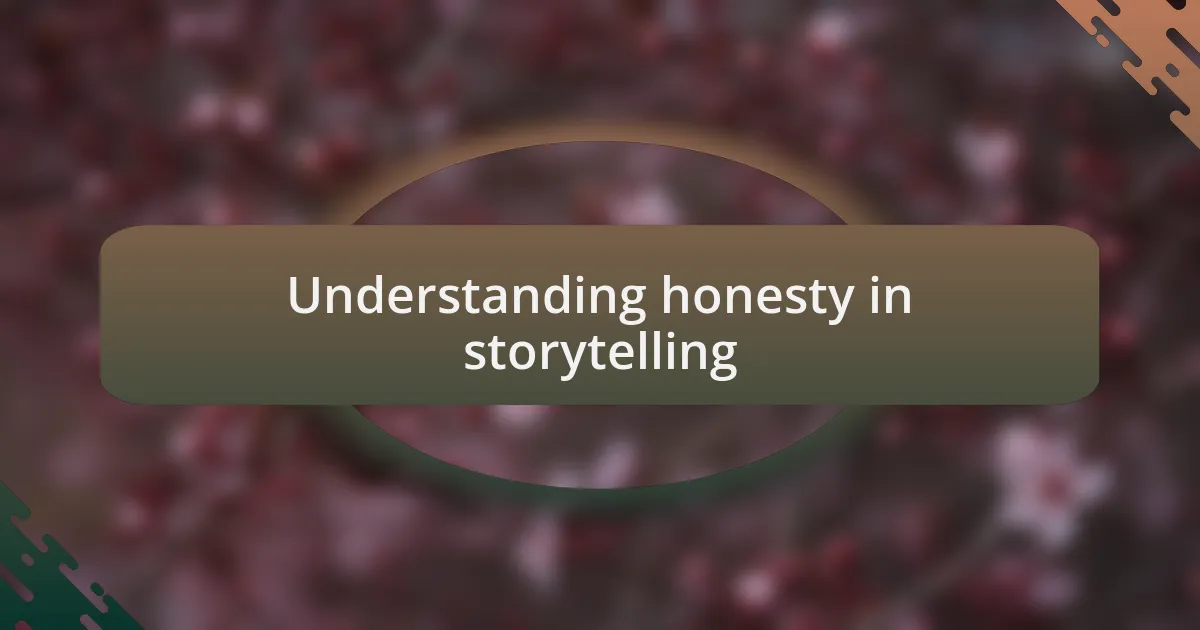
Understanding honesty in storytelling
Honesty in storytelling goes beyond merely recounting events; it’s about the truth we convey through emotions and experiences. I remember telling my daughter a bedtime story about a brave little rabbit who faced his fears. Even though it was a fantasy, I made sure the rabbit’s feelings of doubt and courage were genuine, allowing her to connect with the message on a deeper level. Isn’t it fascinating how children resonate with these honest portrayals of emotions?
When I reflect on my own childhood, I realize how impactful honest storytelling can be. I once listened to a tale of a girl who struggled but ultimately triumphed through her honesty. The way the storyteller conveyed her vulnerabilities made me feel seen and understood. It begs the question: how can we, as storytellers, strive to weave our characters’ honest struggles into meaningful narratives that inspire others?
Exploring honesty in storytelling also means embracing the imperfect truths of life. In my experience, sharing my mistakes and the lessons learned not only engages the audience but also fosters trust. How often do we shy away from those messy parts of a story? Yet, it’s precisely those candid moments that often create the strongest connections with our listeners.
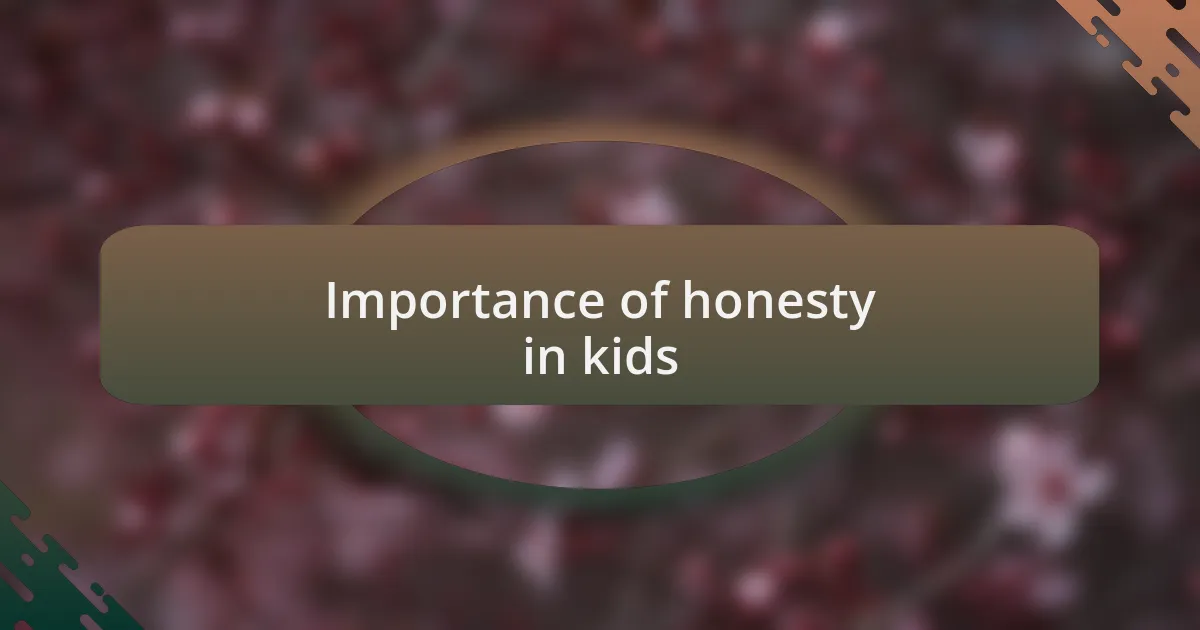
Importance of honesty in kids
Honesty plays a crucial role in a child’s moral development. I recall a moment when my son confessed to accidentally breaking a vase. Instead of reacting harshly, I praised his honesty, emphasizing that it’s always better to tell the truth, even when it’s difficult. This incident not only reinforced his trust in me but also built his sense of integrity as he learned the value of being truthful.
When children embrace honesty, they cultivate relationships based on trust. I’ve seen how my daughter’s friendships flourish when she openly communicates her feelings, even when that means admitting she was hurt. It raises the question: how much easier would our lives be if we all learned to express ourselves honestly, like children do? This open communication fosters understanding and helps them navigate social situations more effectively.
Moreover, honesty in children encourages critical thinking and decision-making skills. When I guide my kids through situations where they must weigh the consequences of being truthful versus lying, I often highlight the long-term effects of each choice. Isn’t it interesting how choosing honesty can shape their future and influence their character? This lesson, I believe, is essential not just for childhood, but for their entire lives.
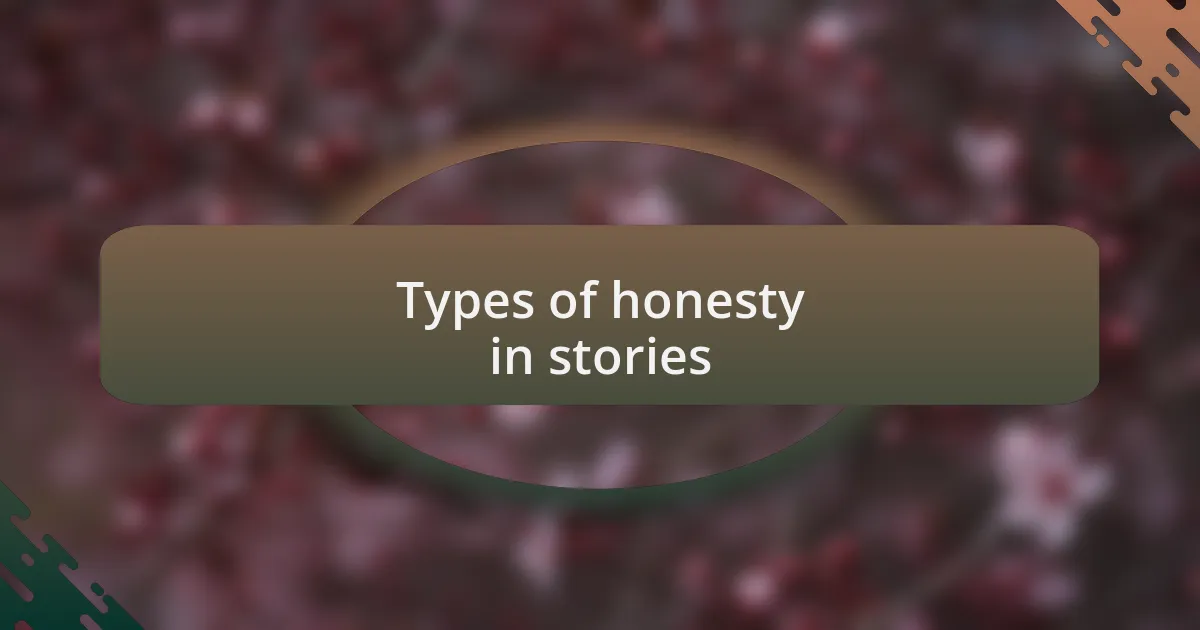
Types of honesty in stories
Stories often embody different types of honesty, each serving a unique purpose in conveying moral lessons. For instance, there’s the simple honesty of characters who admit their mistakes or flaws, like the time I read a story where a young hero revealed his fear of failing. This openness created a connection with readers, reminding me how our vulnerabilities can often lead to personal growth.
Then, there’s the honesty of emotions, which resonates deeply with children. I remember sharing a tale where a parent expressed sadness over a lost pet. This honest portrayal of grief not only validated my child’s feelings when they faced loss but also highlighted how expressing emotions can foster healing. Isn’t it fascinating how these expressions can help kids understand their own feelings better?
Lastly, we have the honest portrayal of life’s complexities, where stories reflect the messy, often challenging truths of our world. For instance, in a narrative I shared with my kids about a family facing financial struggles, we discussed the importance of empathy and understanding others’ situations. These types of stories encourage kids to think critically about honesty in difficult scenarios and inspire them to consider different perspectives. Wouldn’t it be wonderful if children learned to navigate life’s challenges with such wisdom?
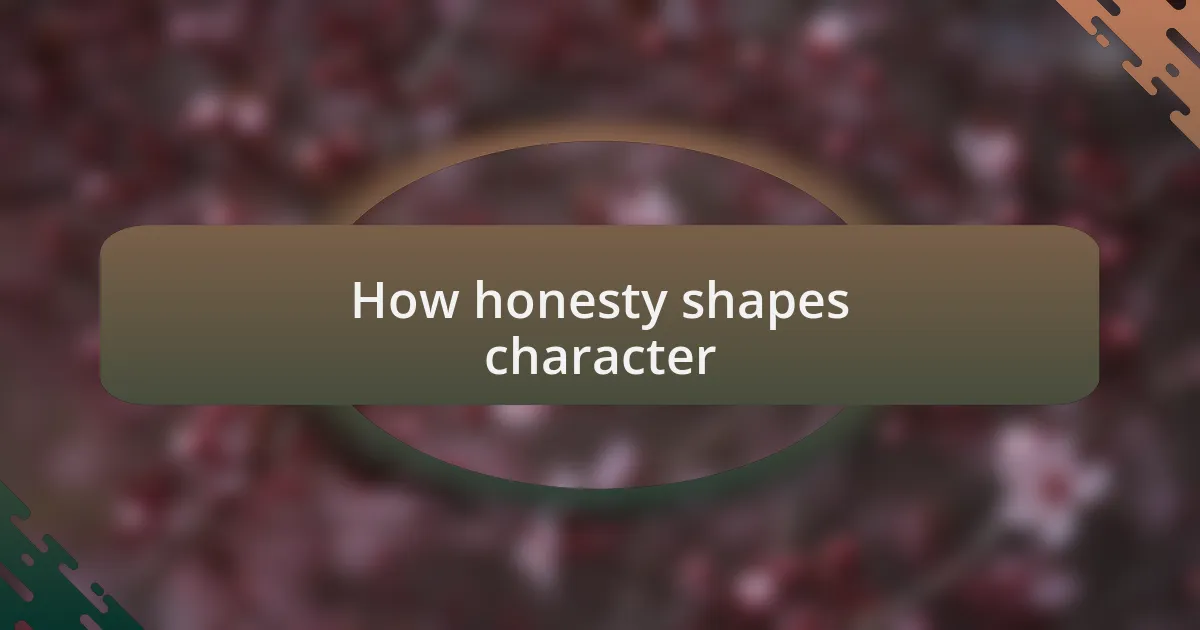
How honesty shapes character
Honesty is a cornerstone of character development that unfolds naturally as children grow. I recall a moment with my daughter when she chose to tell the truth about accidentally breaking a cherished vase. Instead of hiding, she faced the situation head-on. This choice not only strengthened her trustworthiness but also deepened her understanding of responsibility, teaching her that honesty can be much braver than deception.
When children embrace honesty, they often discover more about themselves. I remember a time when my son, while working on a school project, realized he had copied someone else’s idea. It was sobering for him to reflect on the consequences of that choice. By admitting his mistake, he not only salvaged his integrity but also learned about authenticity in his work. Isn’t it empowering when kids recognize that embracing honesty opens doors to genuine self-expression?
Over time, the habitual practice of honesty can significantly shape a child’s character. I witnessed this firsthand during a family discussion about a friend’s betrayal. My children debated the moral implications of honesty, leading to a profound realization: honesty is not just about transparency; it also builds trust and strengthens relationships. Don’t you think this kind of understanding lays a solid foundation for a compassionate and resilient character?
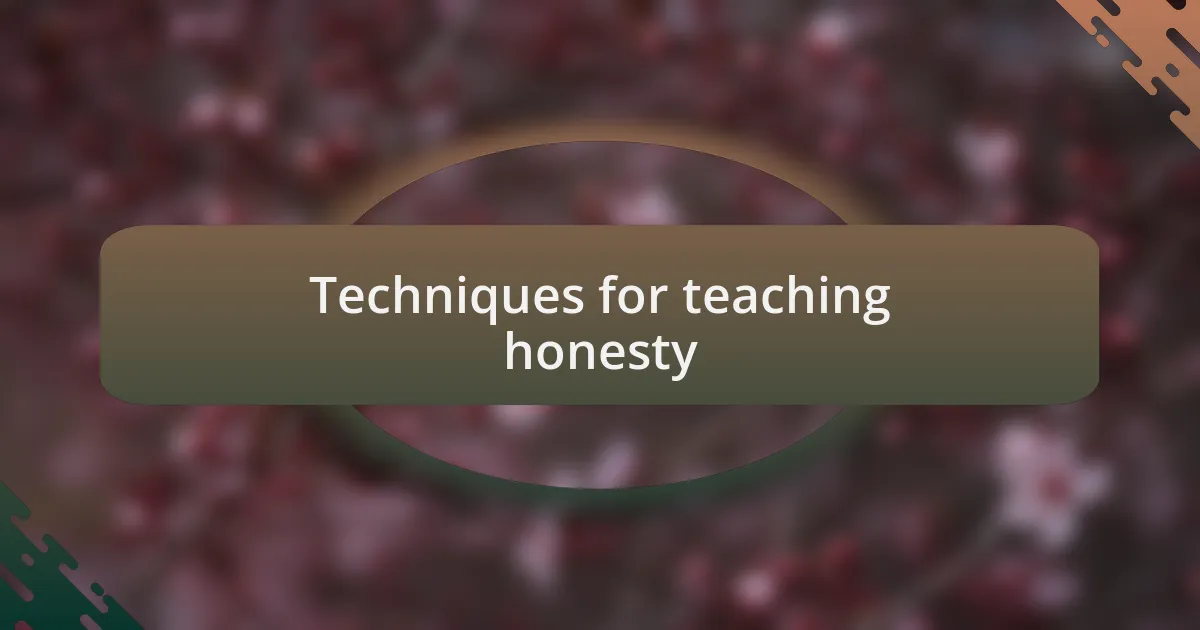
Techniques for teaching honesty
One effective technique for teaching honesty is through role-playing scenarios. I once set up a situation with my kids where they had to decide whether to keep a toy they found or to return it to its rightful owner. Watching them navigate their decisions was eye-opening; their discussions revealed the deeper layers of what it means to act honestly. Have you ever noticed how kids grasp moral dilemmas when they actively participate in them?
Another method that worked wonders in our family was storytelling. I shared tales from my childhood where honesty played a pivotal role, showcasing both the difficult moments and the positive outcomes. My son was particularly captivated by one story where I had to confess to a mistake at school. He expressed how he admired my courage, and that inspired him to open up about his own struggles. Isn’t it amazing how personal stories can bridge generational gaps and instill important values?
Lastly, I find that encouraging open conversations about honesty can be transformative. During dinner, we often discuss various instances where honesty was both tested and rewarded. These discussions serve as a platform for my kids to express their thoughts and feelings about honesty. A recent conversation took a turn when my daughter reflected on a classmate’s secret. It was a moment that reinforced her understanding that honesty, at times, means having tough conversations. Don’t you love how these moments encourage them to think critically about their own actions?
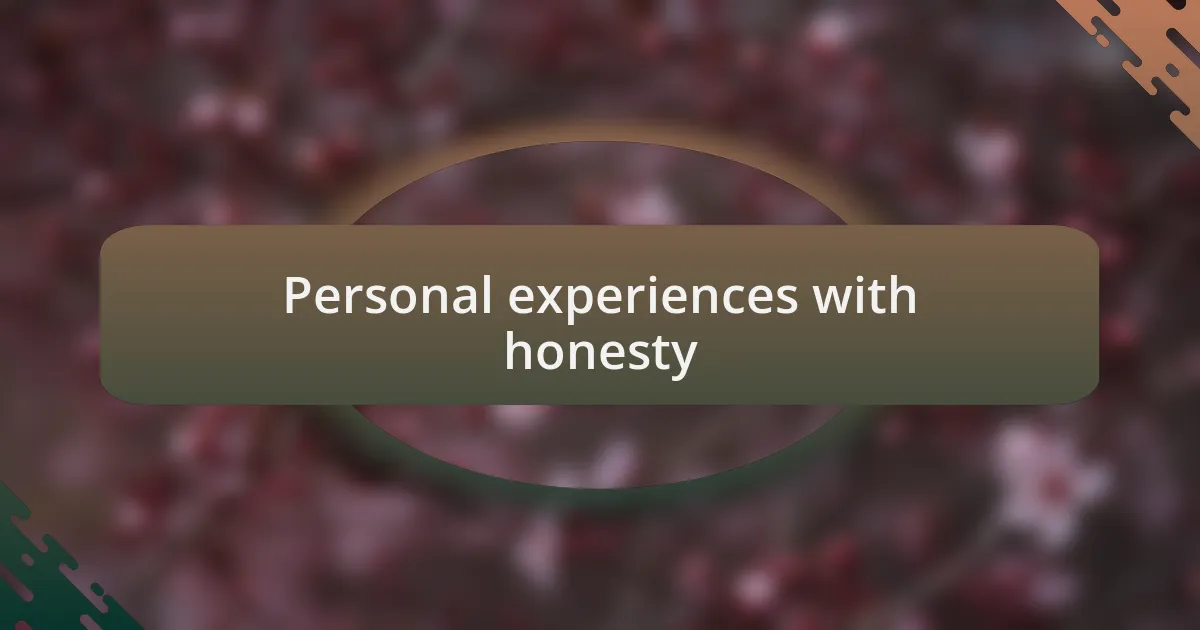
Personal experiences with honesty
I remember a time my son came home from school with a toy that wasn’t his. I could see the conflict in his eyes. As we sat together, I gently asked him how he would feel if someone took something from him. The weight of my question hung in the air, and witnessing his internal struggle was both heartbreaking and enlightening. That moment taught me firsthand how honesty isn’t just about right or wrong; it’s a profound emotional engagement.
Another experience that stands out is the day my daughter courageously admitted to breaking a vase. I could feel my heart swell with pride when she shared her mistake instead of hiding it. We discussed the importance of honesty even when it’s uncomfortable. It was apparent that she not only learned a valuable lesson but also felt a sense of relief by being truthful. Could it be that the freedom that comes with honesty is even more rewarding than avoiding consequences?
Lastly, there was a conversation I had with my youngest about his favorite cartoon character, who often found themselves in sticky situations because they lied. He turned to me and said, “Why do they keep lying when they could just tell the truth?” That simple question resonated deeply within me. It reminded me that children often possess an intrinsic understanding of honesty, but they sometimes need guidance to navigate its complexities. Isn’t it fascinating how their minds work, constantly processing right and wrong?
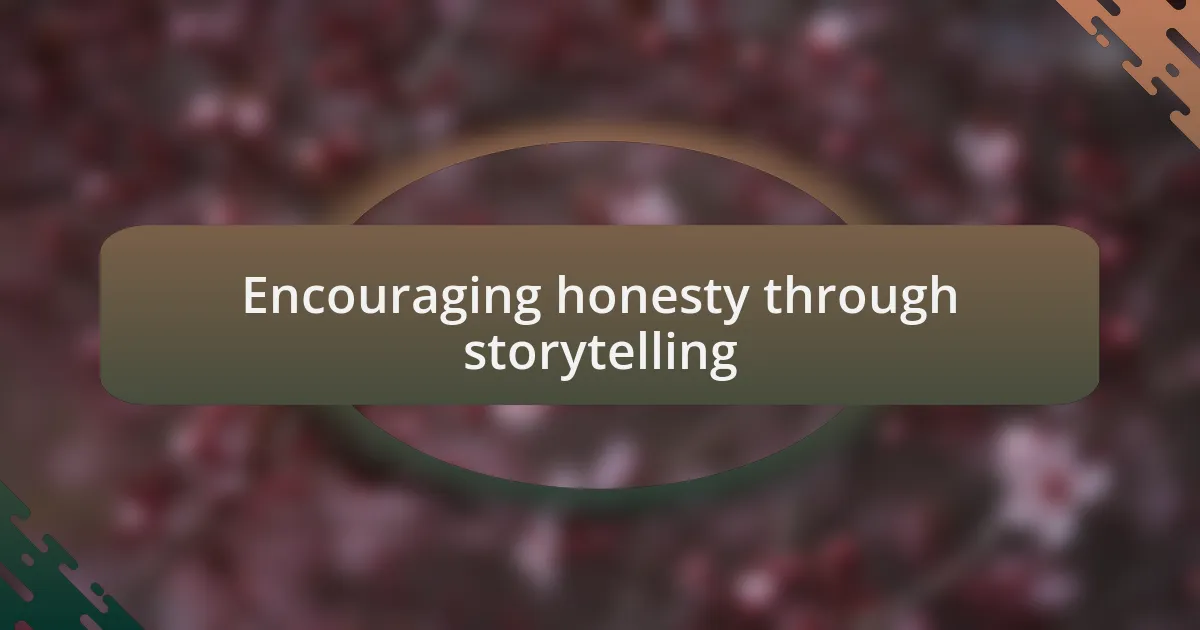
Encouraging honesty through storytelling
When I read my kids a story about a character who faced the consequences of a lie, I noticed their heightened interest. They would often stop me to discuss whether the character should have been honest from the start. In those moments, I realized storytelling was like a mirror reflecting our own choices—prompting questions like, “How would you have acted?”
One evening, we ventured into a book that celebrated a hero’s journey of truth-telling. My daughter leaned in and whispered, “Do you think people really get rewarded for being honest?” That sparked a heartfelt conversation. We explored the idea that while honesty might not always lead to instant rewards, the long-term gains are priceless. It struck me that through stories, my children were learning that honesty isn’t just a rule; it’s a path toward deeper connections with others.
After finishing a story about a child who lied to a friend, my son turned to me and said, “It’s tough to be honest sometimes.” I felt that truth resonate in our discussion. We spoke about the fear of losing friends or getting in trouble and how stories can validate those feelings. Yet, together, we also discovered how characters who embraced honesty ended up building stronger friendships. Isn’t it interesting how these tales can guide our children toward their own honest choices, highlighting the power of storytelling in shaping values?